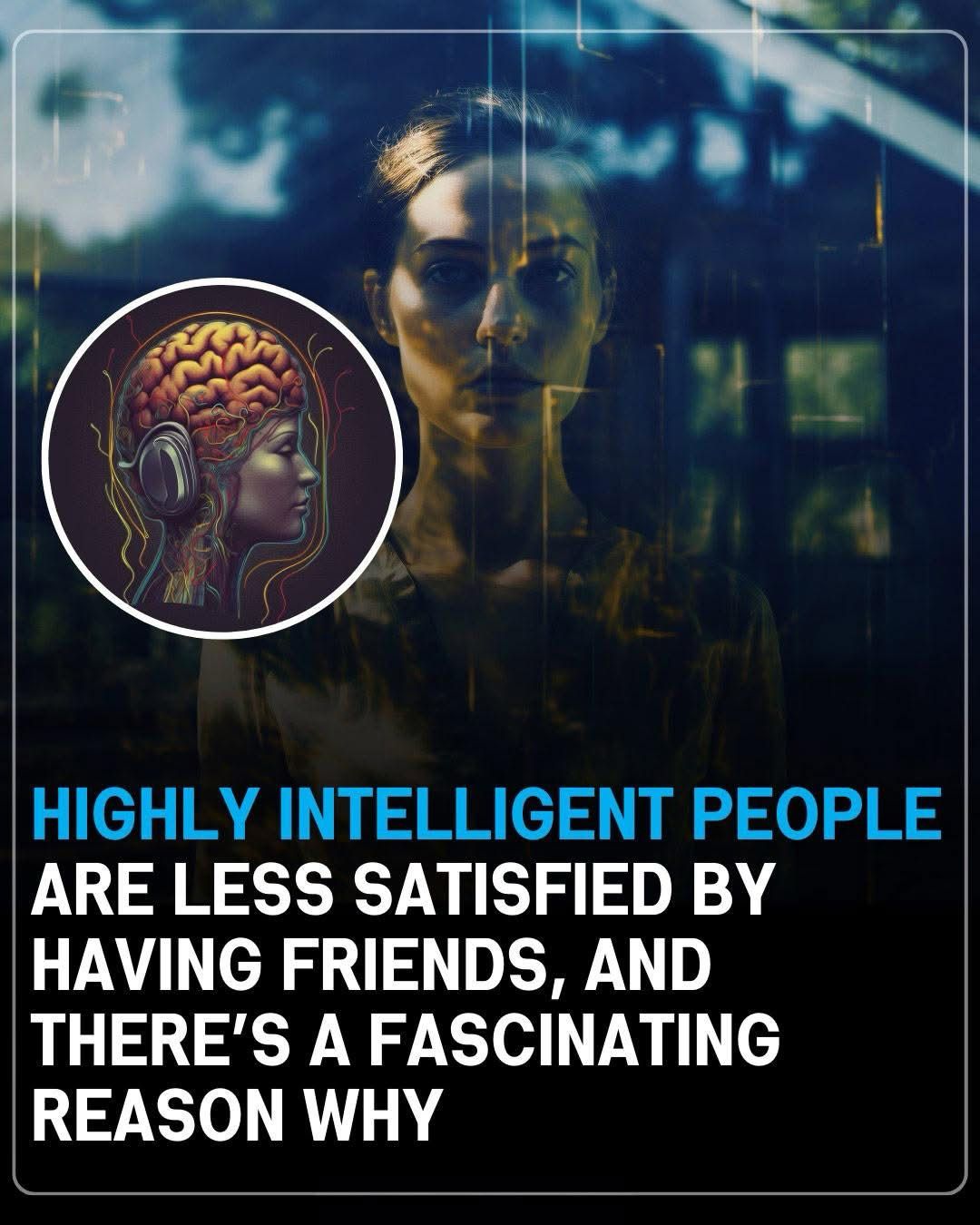Have you ever noticed that some of the smartest people you know aren’t exactly the most social butterflies?

Maybe you have a friend who would rather stay home working on a passion project or getting lost in a book instead of going out with the crowd, and it’s easy to wonder if something’s wrong or if they’re just shy or aloof, but surprisingly, science offers a fascinating explanation that makes perfect sense once you understand it, because research suggests that highly intelligent people often have fewer friendships and feel less satisfied socializing, and if you’re someone who feels content with a small circle of close friends—or even just yourself—it might actually be a quiet sign of higher intelligence, something that could have saved many of us a lot of confusion and unnecessary worry back in middle school when fitting in seemed like the most important thing in the world
so what’s really going on here, and why does more brainpower sometimes translate into less friend power, well to answer that, we have to rewind human history all the way back to the days of ancient tribes where being social wasn’t just about fun but about survival, because humans evolved as social beings who depended on tight-knit groups to hunt, gather, and protect one another, and evolutionary psychologists have introduced the “savanna theory of happiness,”
which explains that our brains are still wired to thrive in small, familiar communities like the clans our ancestors lived in, meaning that for most people today, meaningful social interaction boosts happiness and well-being, much like it did for our ancient relatives sitting around a fire telling stories, and studies even show that people living in densely populated areas often report lower happiness compared to those who socialize frequently with close friends, fitting that ancient pattern of needing strong personal bonds, but here’s where it gets interesting:
if human brains are wired to love friendship so much, why would highly intelligent individuals seem to deviate from that formula and actually feel less happy the more they socialize, shouldn’t smarter people recognize that friends equal happiness and eagerly build a large social circle, well a 2016 study published in the British Journal of Psychology sheds light on this paradox by surveying over 15,000 people and finding that while frequent socializing generally boosts life satisfaction for most, for those with the highest IQs, the pattern was different—frequent socializing either had no effect or actually reduced their life satisfaction, meaning that the usual happiness boost from being around friends didn’t apply in the same way, and it seems that for highly intelligent people, more social interaction can actually become tiring or even emotionally draining, but that doesn’t mean they dislike friendships or hate people; instead, it suggests that their fulfillment often comes from other sources like pursuing ambitious goals or engaging in deeply satisfying solitary activities, because smart people are more likely to focus on long-term objectives like mastering a skill, inventing technology, creating art, or advancing a career, investing energy in meaningful work rather than constant social gatherings, and they also tend to prefer quality over quantity in their relationships, valuing a few deep, meaningful connections rather than having a large number of acquaintances, kind of like choosing a gourmet meal at a quiet restaurant over sampling every dish at a crowded buffet, and another theory suggests that because highly intelligent individuals adapt more easily to modern environments, they don’t rely as heavily on constant companionship for their happiness as our ancestors once did, meaning they can thrive in both busy cities and peaceful solitude, finding deep joy in writing, coding, painting, inventing, or whatever solitary pursuit inspires them most, so it’s not about avoiding people out of dislike but about making choices that align better with their personal fulfillment, and a relatable example would be someone like Alex, a brilliant software developer who spends most of his evenings and weekends coding a groundbreaking educational app while his college friends invite him out, and although he enjoys occasional meetups, frequent outings leave him feeling drained and anxious about neglecting his goals, so Alex maintains a couple of very close friendships that offer him just the right amount of social interaction without pulling him away from his passions, reflecting exactly what studies have shown about how highly intelligent individuals often prefer fewer, deeper social ties and focus their energy on pursuits that truly inspire them, and while not every smart person is an introvert or loner, the trend is clear that those with higher IQs are generally more comfortable with less frequent socializing, showing us that not craving a massive friend group is perfectly normal for certain people, and instead of seeing it as a flaw, we should recognize it as a different way of experiencing and prioritizing happiness, because at the end of the day, what this research highlights is that happiness is deeply personal and unique, and if spending time alone or maintaining just a few close friendships makes someone feel fulfilled, it’s not a failure—it’s just another beautiful way of living and thriving.





